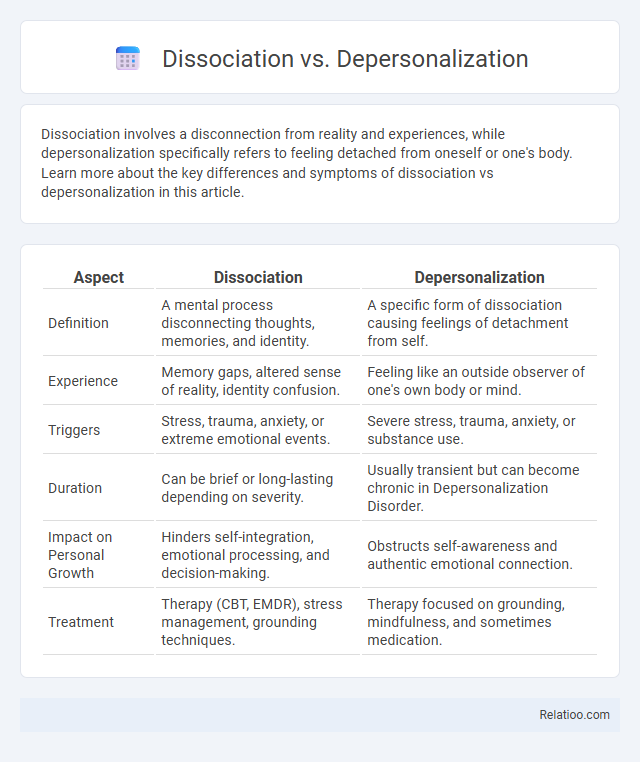Dissociation involves a disconnection from reality and experiences, while depersonalization specifically refers to feeling detached from oneself or one's body. Learn more about the key differences and symptoms of dissociation vs depersonalization in this article.
Table of Comparison
| Aspect | Dissociation | Depersonalization |
|---|---|---|
| Definition | A mental process disconnecting thoughts, memories, and identity. | A specific form of dissociation causing feelings of detachment from self. |
| Experience | Memory gaps, altered sense of reality, identity confusion. | Feeling like an outside observer of one's own body or mind. |
| Triggers | Stress, trauma, anxiety, or extreme emotional events. | Severe stress, trauma, anxiety, or substance use. |
| Duration | Can be brief or long-lasting depending on severity. | Usually transient but can become chronic in Depersonalization Disorder. |
| Impact on Personal Growth | Hinders self-integration, emotional processing, and decision-making. | Obstructs self-awareness and authentic emotional connection. |
| Treatment | Therapy (CBT, EMDR), stress management, grounding techniques. | Therapy focused on grounding, mindfulness, and sometimes medication. |
Understanding Dissociation: A Brief Overview
Dissociation involves a disruption in the normal integration of consciousness, memory, identity, or perception, often as a response to trauma or stress, whereas depersonalization specifically refers to feelings of detachment from one's own body or thoughts. Understanding dissociation requires recognizing it as a spectrum, ranging from mild daydreaming to more severe conditions like dissociative identity disorder. Differentiating these phenomena aids in accurate diagnosis and targeted treatment for dissociative disorders.
What is Depersonalization?
Depersonalization is a specific type of dissociation characterized by a persistent or recurrent feeling of detachment from your thoughts, body, or sense of self, often described as feeling like an outside observer of your own life. Unlike general dissociation, which encompasses a broad range of experiences such as memory gaps or identity confusion, depersonalization specifically involves altered self-perception and emotional numbing. Understanding depersonalization is crucial for distinguishing it from related conditions like derealization, which affects your perception of the external world rather than your self-awareness.
Key Differences Between Dissociation and Depersonalization
Dissociation involves a broad disruption in the normal integration of consciousness, memory, identity, or perception, often resulting in detachment from reality or oneself. Depersonalization specifically refers to feeling detached from your own body or thoughts, creating a sense of being an outside observer of yourself. Unlike dissociation, which encompasses various experiences such as amnesia or identity confusion, depersonalization centers exclusively on alterations in self-awareness and personal identity.
Common Causes of Dissociation
Dissociation commonly arises from trauma, chronic stress, or severe anxiety, often serving as a psychological defense mechanism against overwhelming experiences. Depersonalization, a specific subtype, manifests as a detachment from one's sense of self, frequently triggered by similar traumatic or stressful events. Understanding the common causes of dissociation involves recognizing its roots in early life trauma, PTSD, and extreme emotional distress, which disrupt normal cognitive and emotional integration.
Triggers and Origins of Depersonalization
Depersonalization arises primarily from intense stress, trauma, or neurological factors, distinguishing it from general dissociation, which can occur as a broader psychological defense mechanism. Triggers for depersonalization often include severe anxiety, panic attacks, or traumatic experiences such as abuse or accidents, reflecting its roots in the brain's response to overwhelming situations. Understanding your specific triggers is crucial for effective management and differentiating depersonalization from other forms of dissociation.
Symptoms: How Dissociation and Depersonalization Manifest
Dissociation manifests as disruptions in memory, identity, or perception, often causing gaps in awareness and emotional numbing, whereas depersonalization specifically involves feelings of detachment from your body or self, as if observing yourself from outside. Symptoms of dissociation include amnesia, derealization, and identity confusion, while depersonalization symptoms emphasize a persistent sense of unreality or feeling disconnected from one's thoughts and sensations. Understanding these distinctions helps in recognizing how dissociation impacts your mental state differently from depersonalization.
Psychological Impact: Short-term and Long-term Effects
Dissociation, depersonalization, and derealization each present unique psychological impacts, influencing your mental state both short-term and long-term. Short-term effects often include confusion, memory gaps, and emotional numbness, while long-term consequences can lead to chronic anxiety, depression, and impaired social functioning. Understanding these variations helps tailor effective treatment approaches, improving your overall mental health and coping strategies.
Diagnostic Criteria: Identifying Dissociation and Depersonalization
Dissociation involves a disruption in the normal integration of consciousness, memory, identity, or perception, characterized in the DSM-5 by symptoms such as amnesia, identity confusion, or identity alteration. Depersonalization, a subtype of dissociative disorders, is specifically defined by persistent or recurrent experiences of feeling detached from oneself, as if observing one's thoughts or body from outside, without losing reality testing. Accurate diagnosis relies on distinguishing dissociative amnesia, dissociative identity disorder, and depersonalization/derealization disorder based on symptom presence, duration, and impact, with clinical assessment tools like the Dissociative Experiences Scale aiding in identification.
Treatment Approaches and Coping Strategies
Treatment approaches for dissociation, depersonalization, and dissociative disorders often include cognitive-behavioral therapy (CBT), trauma-focused therapy, and medication management such as selective serotonin reuptake inhibitors (SSRIs) to reduce symptoms. Coping strategies emphasize grounding techniques, mindfulness practices, and psychoeducation to help individuals manage intrusive dissociative episodes and regain a sense of reality. Integrating therapy with community support and stress reduction can enhance overall functioning and long-term recovery outcomes.
Seeking Help: When to Consult a Mental Health Professional
Recognizing when to seek help for dissociation, depersonalization, or derealization is crucial for your mental health, especially if episodes become frequent, distressing, or interfere with daily functioning. Consulting a licensed mental health professional familiar with dissociative disorders ensures accurate diagnosis and effective treatment, including psychotherapy or medication options. Early intervention can prevent symptom escalation and improve coping strategies tailored to your specific experiences.

Infographic: Dissociation vs Depersonalization
 relatioo.com
relatioo.com